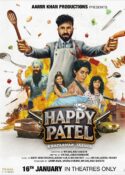 Raaz is pretty much an original spook story, told with terrific elan and a high-velocity suspense that tears across the screen with a bloodcurdling scream. Vikram Bhatt is no stranger to thrillers. His very first film, Fareb (inspired by a Hollywood film, Unlawful Entry), was a thriller of shocks.
Raaz is pretty much an original spook story, told with terrific elan and a high-velocity suspense that tears across the screen with a bloodcurdling scream. Vikram Bhatt is no stranger to thrillers. His very first film, Fareb (inspired by a Hollywood film, Unlawful Entry), was a thriller of shocks.
Bhatt’s previous film (inspired by What Lies Beneath) was a far less in-your-face suspense thriller than Raaz. Everything this time around is more sensuous, tactile, thrilling, throbbing with terror and anxiety. Bhatt builds a field of foreboding through age-old gimmicks associated with the horror genre. Doors creak and open ominously, screams rent the air with piercing suddenness, and a fog envelopes the studiously silent landscape in Ooty to convey the terror within.
Cinematographer Pravin (the director’s father) captures the inner and outer landscape in shades of ebony evil. As is the tradition in horror-suspense films, most of Raaz is shot in the dark. Pravin Bhatt makes us “see” invisible images and apparitions moving in the dark so that we actually begin to feel the terror of the protagonist Sanjana (Bipasha Basu) as she plunges and lunges into a tunnel of supernatural terror.
In a cursory prologue, we see Sanjana’s marriage with (Dino Morea) collapsing in a heap. The two take off for Ooty to mend their marriage. Immediately, Sanjana begins to hear voices. No, it isn’t schizophrenia; it’s a presence in their house trying to make contact with her.
Director Vikram Bhatt weaves Sanjana’s neurosis into the atmosphere of terror so that the two predominant emotions mingle with a nerve-tingling impact. There isn’t much on-screen horror or visual terror. The implicit fear reminiscent of the great Hollywood horror classics The Exorcist and Omen builds up ominously and explodes into an edge-of-the-seat climax in the Ooty forest where Sanjana, doing a neo-modernist horror version of the Hindu mythological tale of Savitri who saved her husband Satyavan from the clutches of death, brings her husband back from the dead by combating the evil presence that threatens to destroy her life marriage and equilibrium.
Once again, Vikram Bhatt proves himself a masterful storyteller. The momentum, especially in the second half, when the narrative goes into a chillingly unexpected flashback, is superbly preserved to the end. Of course, a lot of the film’s impact depends on the principal performance.
Bipasha Basu, as the wife battling a demon from her husband’s past, holds the key to the film’s impact. She’s far more expressive than the other model, Lisa Ray, in Bhatt’s previous thriller Kasoor. But it would be erroneous to say Bipasha rises to the occasion. Bhatt pulls up a relatively deadpan performance to the level of lucid articulation through the lighting, background music (Raju Rao), and cinematography. Ms Basu has expressive eyes. But she tries too hard to convey inexpressible emotions. That, in a way, works to Bhatt’s advantage since Raaz is about trying to make sense of the supernatural.
Surprisingly, television actress Shruti Ulfat, who plays Bipasha Basu’s best friend, communicates the sheer terror of the situation far better than the leading lady.
Dino Morea, as the husband who pays for his phallic fallacy, makes the best of his interesting role. Like many models turned actors, he isn’t much of an actor. Ashutosh Rana, as the exorcist, exerts his facial muscles to a breaking point. He seems to have seen lots of horror films from Hollywood before playing his petrified character.
The most interesting character in Raaz is played by model Malini Sharma. As the whacked-out libertine who entraps the hero in a lustful liaison, she‘s required to convey an aggressive sexuality usually denied to female characters in mainstream Hindi cinema.
Nadeem-Shravan’s chart-busting music is another plus point in the prickly plot. Bhatt makes telling use of catchy melodies to convey the sensuous underbelly in the horrifying exterior.
Raaz is a film that breaks many mainstream moulds. Cleverly it creates new moulds by using age-old conventions from ghost stories that grandma told us. True, Granny kept the sex out of her narrative. But she really believed in ghosts. Vikram Bhatt doesn’t. He creates a fabulous fear from formulistic impulses, invests a spellbinding nervous –energy into the spindly web of his narrative. Horror in Hindi cinema, before Raaz, was restricted to the gore-and-goo blend of the films by the Ramsays.
Suddenly, we get a horror film that contains skilful special effects, glamorous faces, and eye-catching locales. The impact is heady and deadly.











